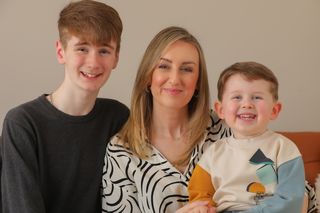'You can feel the love and compassion in these guidelines' - HSE publishes new standards for supporting bereaved parents
Health Minister Simon Harris Picture: Frank McGrath
No longer will Ireland ignore the silent pain suffered by many parents who experience the loss of a pregnancy or perinatal death, Health Minister Simon Harris has pledged.
He described the new national counselling guidelines for parents looking to access bereavement services as a new beginning.
Mr Harris said that for too long "Ireland had, regrettably, been behind the curve" in supporting those coping with the loss of a baby or foetus.
The minister and the HSE's director-general Tony O'Brien launched the updated national standards, entitled 'Standards for bereavement care following pregnancy loss and perinatal death', at Farmleigh House to a packed audience of midwives, nurses and parents who had suffered such a trauma.
He told them: "This document is important because it puts in writing what Ireland expects of its national health service."
Mr Harris added that he hoped the new regime would give grieving families "the care and compassion they need".
The 84-page report advises that any information given to mothers and families needs to be reliable, accurate and explained in a sensitive and supportive manner.
It outlines four pillars of bereavement care - the hospital, baby, parents and staff - and states that bereavement and end-of-life care should be organised around the needs of babies and their families.
It also requires all maternity hospitals and units to be staffed with bereavement specialists.
These teams should include a dedicated clinical midwife specialising in bereavement care, along with obstetricians, paediatricians, neonatologists, chaplains, social workers and palliative-care staff.
The document says that bereavement care should be offered in accordance with the religious, secular, ethnic, social and cultural values of the parents.
The guidelines are updated to acknowledge cases of fatal foetal abnormality and say there is a duty of care towards those who have travelled abroad for an abortion.
Bereavement
Other recommendations include that a certain prescribed language be used when breaking the news of a death or "life-limiting condition" to parents.
Figures detailed in the report show that there were some 500 perinatal deaths in 2013, including 301 stillbirths.
There are also around 14,000 miscarriages a year in Ireland.
Twenty-six terminations were carried out in 2014 under the Protection of Life During Pregnancy Act.
The document also noted that there were 3,735 terminations undertaken in England and Wales during the same period for women with an address in Ireland.
"These standards absolutely apply to all," said Mr Harris.
Among the cases that heavily shaped the report was the death of Savita Halappanavar, who died in October 2012 at University Hospital Galway due to complications of a septic miscarriage.
Ciarán Browne, chair of the sub-committee that was tasked with drawing up the new standards, said a copy of the new guidelines had been sent to her husband Praveen.
The guidelines were welcomed by Sarah Nugent of Every Life Counts, which supports parents of children who were diagnosed with a terminal condition.
Ms Nugent, from Portlaoise, Co Laois, described the heartache her family endured when her daughter Isabella was born with a peroxisomal disorder in 2014 and died 54 days later.
Speaking to RTE Radio One’s Morning Ireland on Thursday, she said: “I didn’t find out that she was sick until after she was born.”
She added: “In my experience, there was no system in place to provide support to you and your family. It was very much coming from a medical point of view.
“It was a very difficult time. Isabella was in hospital for her whole life. She was in an intense care setting so it was very difficult for family to see her.”
Ms Nugent’s young son in particular found it hard as he was only allowed to see his sister twice in her short life.
“There were a couple of times when we could sneak him in but you had to have the right security guard and the right nurse on duty. It was really people putting their jobs on the line to facilitate you getting a bit of time with her,” she said.
After Isabella died, Ms Nugent said she didn’t receive counselling, and praised the new guidance for ensuring families would receive the necessary care and compassion.
“They left no ambiguity as to what people’s roles are in different scenarios, be it ectopic pregnancy, be it stillborn, or be it neo-natal death. It’s so clear for every stage of the process.
“You can feel the love and compassion in these guidelines,” she said.
Join the Irish Independent WhatsApp channel
Stay up to date with all the latest news















